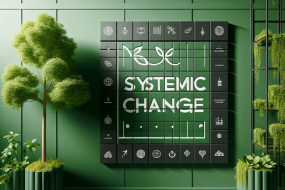
Earth in Overdraft: The Non-negotiable Need for Systemic Change
Dr. Farhad Reyazat
January 2024
In an era where our planet teeters on the brink of ecological collapse, the clarion call for systemic change has never been more urgent. As global greenhouse gas emissions soar to unprecedented heights and biodiversity plummets at an alarming rate, the evidence is irrefutable: the very fabric of our existence is under threat. This isn’t just about saving polar bears or cutting down on plastic straws; it’s a profound crisis that challenges the core of how we live, consume, and envision our future. But despair is not our destiny. This article aims to illuminate the path forward, not through incremental adjustments, but through systemic change. It’s a clarion call to reimagine our societies, economies, and personal lives in harmony with the planet’s limits. As daunting as the challenge may seem, within it lies the unparalleled opportunity to forge a future that is not only sustainable but equitable. A future where prosperity doesn’t come at the cost of the planet or the vast majority of its inhabitants.
To advocate for systemic change for a sustainable future, various figures and statistics can be leveraged to illustrate the urgency and the potential impact of such transformations. Here are several key figures that highlight the necessity of systemic changes:
1. Greenhouse Gas Emissions: According to the United Nations, global greenhouse gas emissions have grown for three consecutive years and are now at an all-time high, pointing to an urgent need for systemic change in how we produce and consume energy.
2. Biodiversity Loss: The World Wildlife Fund’s Living Planet Report 2020 indicated a 68% average decline in global populations of mammals, birds, amphibians, reptiles, and fish between 1970 and 2016. This stark loss of biodiversity signals the need for systemic changes in land use and agriculture.
3. Plastic Pollution: A report by the Ellen MacArthur Foundation predicts that by 2050, there could be more plastic than fish (by weight) in the ocean, suggesting the necessity for systemic changes in waste management and materials use.
4. Water Scarcity: The World Health Organization has reported that by 2025, half of the world’s population will be living in water-stressed areas, Some 700 million people could be displaced by intense water scarcity by 2030. By 2040, roughly 1 in 4 children worldwide will be living in areas of extremely high water stress. underlining the need for systemic changes in water conservation and management.
5. Energy Use and Carbon Footprint: The International Energy Agency reports that the wealthiest 10% of the global population is responsible for over half of the total lifestyle consumption emissions. This disproportionate contribution to climate change by the wealthy underscores the unsustainability of opulent lifestyles at the expense of the planet and the majority of its inhabitants.
6. Agricultural Practices: The Food and Agriculture Organization of the United Nations estimates that agriculture is responsible for 20-25% of the total release of greenhouse gases worldwide, highlighting the need for systemic changes in food production and land use practices.
7. Economic Inequality: According to the World Inequality Report, the world’s richest 1% have more than twice as much wealth as 6.9 billion people. Nearly half of the world’s population – 3.4 billion people – is living on less than $5.50 a day. This severe inequality indicates the need for systemic changes in economic policies to ensure fair distribution of resources and opportunities.
8. Food Waste: The Food and Agriculture Organization (FAO) estimates that one-third of all food produced globally is lost or wasted. This wastage occurs disproportionately in high-income countries, where the demand for a variety of food products year-round encourages overproduction and overconsumption.
9. Transport and Travel: The International Transport Forum highlights that aviation, largely a domain of the wealthier segments of the population, is one of the fastest-growing sources of greenhouse gas emissions. The luxury of frequent flying contributes disproportionately to carbon emissions compared to the global population that rarely or never flies.
10. Resource Consumption: According to the Global Footprint Network, humanity is using nature 1.7 times faster than our planet’s biocapacity can regenerate. That’s equivalent to using the resources of 1.7 Earths. The same report refers that we need 5.1 Earths if everyone on the planet lived like the residents of the US.
These facts illustrate how the current economic system, by promoting overconsumption and enabling opulent lifestyles for a minority, is inherently unsustainable. It leads to the depletion of natural resources, exacerbates inequality, and contributes significantly to climate change and environmental degradation. Systemic change is required to shift towards a more equitable, sustainable model that ensures the well-being of all people and the planet.
As we stand at the crossroads of history, faced with the undeniable evidence of our unsustainable trajectory, the call for systemic change is not just a plea—it’s an imperative. The facts laid out in this article underscore a truth that can no longer be ignored: without a profound shift in how we live, consume, and allocate our planet’s precious resources, the future of humanity and the Earth itself hangs in the balance. From the alarming rates of greenhouse gas emissions to the devastating loss of biodiversity, and from the stark inequalities exacerbated by our economic models to the profligate waste of our natural resources, each point underscores the urgent need for a holistic and integrated approach to sustainability.
This isn’t merely about adopting greener practices; it’s about rethinking and reshaping the very foundations of our societies and economies. Systemic change means transforming our energy systems to be renewable and sustainable, redesigning our cities and transportation to reduce emissions and waste, overhauling our agricultural practices to be more equitable and environmentally friendly, and fundamentally redefining what we value in our economies beyond mere growth. It calls for bold leadership, innovative policies, and a collective commitment to a just transition that ensures no one is left behind.
In conclusion, embracing systemic change is not only essential for safeguarding our planet—it’s critical for ensuring a fair, prosperous, and sustainable future for all. We are the architects of our future, and the choices we make today will echo through generations. Let this be the moment we choose a path that leads to a world where harmony between humanity and nature isn’t just an ideal, but a reality. The time for systemic change is now; let us seize it with both hands and move forward together, for the sake of our planet and future generations.
References
1. Greenhouse Gas Emissions:
– United Nations Environment Programme (UNEP), Emissions Gap Report 2020.
United Nations Environment Programme (2020). Emissions Gap Report 2020. [online] UNEP. Available at: [https://www.unep.org/emissions-gap-report-2020] (https://www.unep.org/emissions-gap-report-2020).
2. Biodiversity Loss:
– World Wildlife Fund, Living Planet Report 2020.
World Wildlife Fund (2020). Living Planet Report 2020. [online] WWF. Available at: [https://www.worldwildlife.org/pages/living-planet-report-2020](https://www.worldwildlife.org/pages/living-planet-report-2020).
3. Plastic Pollution:
– Ellen MacArthur Foundation, New Plastics Economy Report.
Ellen MacArthur Foundation (2016). The New Plastics Economy: Rethinking the future of plastics. [online] Ellen MacArthur Foundation. Available at: [https://www.ellenmacarthurfoundation.org/publications](https://www.ellenmacarthurfoundation.org/publications).
4. Water Scarcity:
– World Health Organization (WHO) and United Nations Water, 2021.
World Health Organization and UN-Water (2021). Water Scarcity. [online] WHO. Available at: [https://www.who.int/news-room/fact-sheets/detail/drinking-water](https://www.who.int/news-room/fact-sheets/detail/drinking-water).
5. Energy Use and Carbon Footprint:
– International Energy Agency, World Energy Outlook Reports.
International Energy Agency (2020). World Energy Outlook 2020. [online] IEA. Available at: [https://www.iea.org/reports/world-energy-outlook-2020](https://www.iea.org/reports/world-energy-outlook-2020).
6. Agricultural Practices:
– Food and Agriculture Organization of the United Nations, FAO Stat.
Food and Agriculture Organization of the United Nations (2020). *FAOSTAT: Emissions Agriculture*. [online] FAO. Available at: [http://www.fao.org/faostat/en/#data/GT](http://www.fao.org/faostat/en/#data/GT).
7. Economic Inequality:
– World Inequality Report 2018.
Chancel, L., Piketty, T., Saez, E., Zucman, G. et al. World Inequality Report 2022, World Inequality Lab.
World Inequality Lab (2018). World Inequality Report 2018. [online] World Inequality Database. Available at: [https://wir2018.wid.world/](https://wir2018.wid.world/).
8. Food Waste:
– Food and Agriculture Organization of the United Nations, The State of Food and Agriculture 2019.
Food and Agriculture Organization of the United Nations (2019). The State of Food and Agriculture 2019. [online] FAO. Available at: [http://www.fao.org/3/ca6030en/ca6030en.pdf](http://www.fao.org/3/ca6030en/ca6030en.pdf).
9. Transport and Travel:
– International Transport Forum, ITF Transport Outlook 2021.
– Citation: International Transport Forum (2021). ITF Transport Outlook 2021. [online] ITF. Available at: [https://www.itf-oecd.org/itf-transport-outlook-2021](https://www.itf-oecd.org/itf-transport-outlook-2021).
10. Resource Consumption:
– Global Footprint Network, National Footprint Accounts 2020.
– Citation: Global Footprint Network (2020). National Footprint Accounts 2020. [online] Global Footprint Network. Available at: [https://www.footprintnetwork.org/our-work/ecological-footprint/](https://www.footprintnetwork.org/our-work/ecological-footprint/).






No Comments